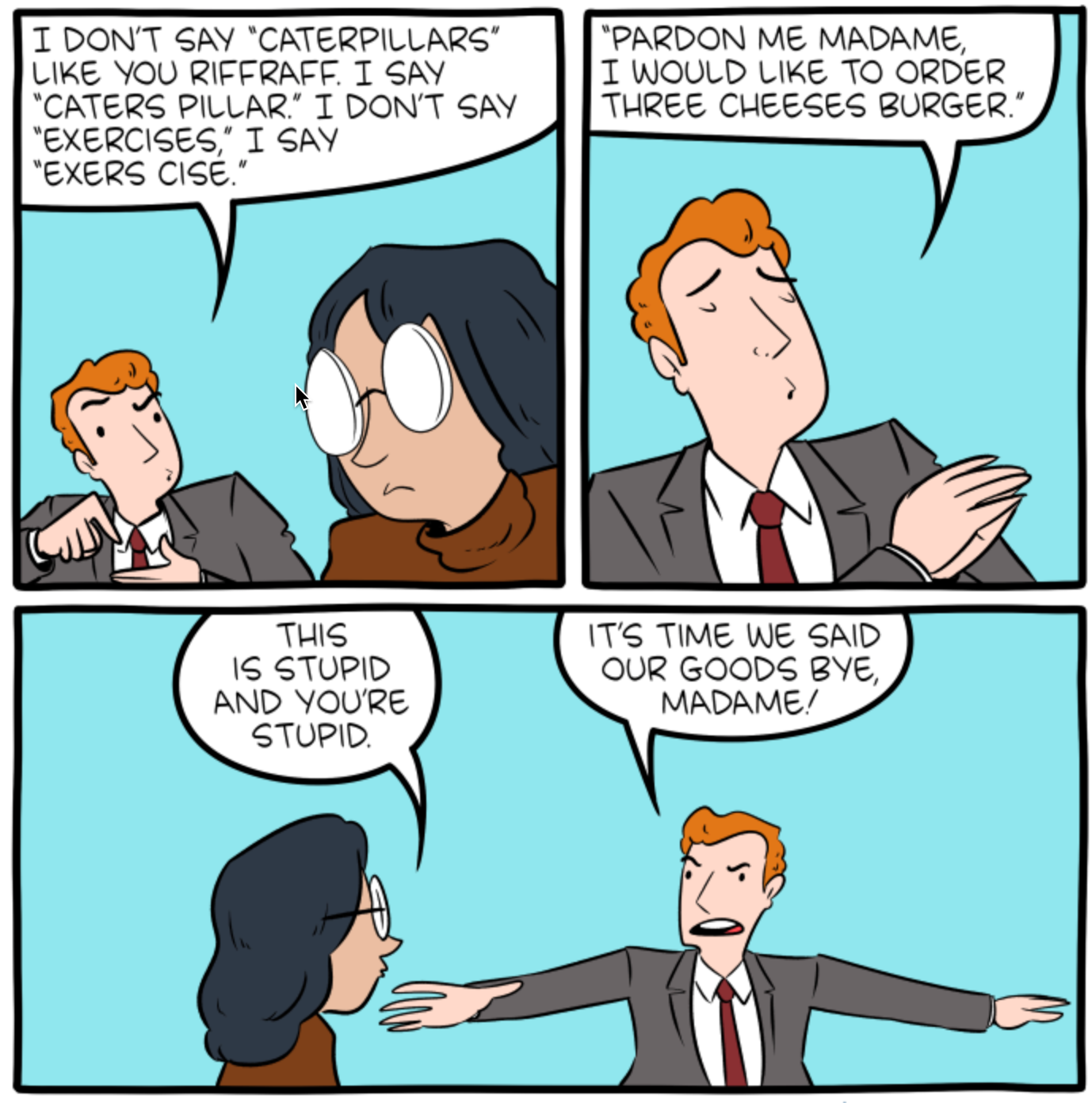Morphological classiness
« previous post | next post »
Today's SMBC:
The mouseover title: "Also, when making a word possessive, I only add an apostrophe, never an s."
The aftercomic:

I suppose that the inspiration for this was cultural capital associated with attorneys general, courts martial, heirs presumptive, handsful, etc. — see here.


Yuval said,
January 10, 2021 @ 5:51 pm
In Hebrew, this works for both pluralization and definiteness (and their combination).
Here is a Moment I collected of some of the times I used this gag on Twitter.
John F said,
January 10, 2021 @ 6:40 pm
Culs-de-sac
MacBooks Pro
;)
Viseguy said,
January 10, 2021 @ 7:05 pm
Hilarious, thank you for sharing. Cavett's "films noir" got me thinking about "Casablanca": "Of all the gins joint in all the towns in all the world…."
Alexander Browne said,
January 10, 2021 @ 8:53 pm
@John F: I always joked "MacBooks Pro", but Apple seems to have endorsed it with the analogous AirPods Pro.
Erik Fjeldstrom said,
January 10, 2021 @ 9:37 pm
@John F: Wouldn't it be "Macsbook Pro" for maximum pretentiousness?
Laichar said,
January 10, 2021 @ 9:58 pm
I guess calques from languages with a different morphological order is fashionable? As a speaker of Chinese, I regularly look for 的s in my writings (especially in titles) to eliminate to make it sound similar to the Classical style for the formality.
Jon said,
January 11, 2021 @ 1:36 am
In the UK, some used to argue that we should say Ms P instead of MPs.
Michael Watts said,
January 11, 2021 @ 2:21 am
I was surprised by "handsful", so I read through the link. I don't read it as supporting the existence of "handsful" in either American or British English, but maybe it does; the citation is quite brief and I can't see the context.
But I don't see how "handsful" would arise in the first place; an attorney general is a kind of attorney, an heir presumptive is a kind of heir, a passerby is someone passing by, but a handful is not a kind of hand. If you said "three hands full of dirt" to me, I would imagine three hands.
Philip Taylor said,
January 11, 2021 @ 4:26 am
For me (native speaker of <Br.E>), "Culs-de-sac" and "MacBooks Pro" seem unexceptionable (the former modelled on plats du jour, the latter on "courts martial"), but even more so "films noir", for which the alternative form would strike me as just plain wrong.
As to "handsful", I transcribe a fair number of recipes, and would always use (e.g.,) "tablespoonsful", so "handsful" just seems to me an extension of that. I would draw the line, tho', at writing "I had to read through a number of Cs.V. today …
David Morris said,
January 11, 2021 @ 4:42 am
Is the plural of curriculum vitae (CV) curricula vitae (CV)?
David Morris said,
January 11, 2021 @ 4:42 am
vitarum????
Fi said,
January 11, 2021 @ 6:06 am
David, it depends on how many lives you have had and curriculized.
F said,
January 11, 2021 @ 6:15 am
Definitely "vitae" if they're all for the same person (reincarnation excepted).
Philip Taylor said,
January 11, 2021 @ 6:16 am
Yes, I fully expected the Latin scholars to argue that "CV" takes no "s" in the plural (an opinion with which I have considerable sympathy) , but in everyday usage one does tend to speak of, and write, "CVs".
Rose Eneri said,
January 11, 2021 @ 8:45 am
Philip, I'm a native speaker of USA English and not much of a cook, but I'm curious as to the function of the "ful" at the end of "tablespoonsful." Would one not say just "tablespoons." If one meant overfilled tablespoons, I believe we would call them "heaping" tablespoons.
By a quick check of various cookbooks I have, I see only tablespoons used for the plural form.
Michael Watts said,
January 11, 2021 @ 10:54 am
Personally, I would expect a cookbook to say "3 tbsp", but yes, I would read that as "3 tablespoons", with no "-ful" anywhere.
Philip Taylor said,
January 11, 2021 @ 11:57 am
"xxxspoonful" is the older usage, but "xxxspoon" as a shorter equivalent caught on within less than a century. I am, perhaps ("almost certainly", some would say) somewhat conservative in my choice of language, so while I will happily write "tbsp" for convenience, if I spell it out in full I would do so as "tablespoonful", not "tablespoon". For me, a tablespoon is an item of cutlery, a tablespoonful is a unit of measure. And I buy cookery books, not cook books …
Coby Lubliner said,
January 11, 2021 @ 12:56 pm
With regard to tablespoon vs. tablespoonful: it depends, in my opinion, on whether the reference is to the conventional American measure (1 tbsp. = 1/2 fl. oz.) or a physical tablespoon. Similarly for cup (8 fl. oz.) vs. cupful (a full actual cup, regardless of size).
Pluralizing the "-ful" is another matter.
Lockdown Louie said,
January 11, 2021 @ 1:31 pm
On my first night out drinking as a young man, I took the dubious advice of a friend, and consumed several sloe gins fizz. As I insisted on calling them.
Andreas Johansson said,
January 11, 2021 @ 1:36 pm
One might have thought the classy plural of "film noir" would be "films noirs".
On the rare occasions I use it, though, I use it as an uncountable genre label. I would not be too surprised if I've said or written "film noir films" on some occasion.
Victor Mair said,
January 11, 2021 @ 1:56 pm
Julius Caesar walks into a bar and says, "I'll have a Martinus." The bartender gives him a puzzled look and asks, "Don't you mean a Martini?" "Look," Caesar replies, "If I wanted a double, I'd have asked for it!"
Benjamin E. Orsatti said,
January 11, 2021 @ 3:16 pm
Isn't this just a matter of preserving the pluralization conventions of the borrowed-from language? Cul-de-sac is French, and it's the "cul" that's plural, not the "sac", so we put an "s" on it, like the French do. But we don't talk about 2 "samurais" or 3 "origamis", or 4 "kois", because the Japanese generally don't mark plural, except to avoid ambiguity. "Attorneys general" was borrowed from legal Norman French, so we keep it that way.
But we _would_ refer to a book of "haikus" or a furniture store full of "futons"…
Michael Watts said,
January 11, 2021 @ 3:26 pm
It can't be, for common words, because nobody knows the original language. For rare words, sure.
It would take a lot more general awareness of Japanese before you could get away with saying "samuraitachi".
RfP said,
January 11, 2021 @ 4:50 pm
In my experience, most people who talk a lot about noir films in English are thinking of the genre, and refer to it as "noir." So if you're referring to several films in that genre, you would call them "noir films."
But if you know enough about film to be discussing "film noir," you're kind of stuck with the French, because "film noirs" just wouldn't sound right to anyone who had actually studied them.
Stephen L said,
January 11, 2021 @ 4:56 pm
@Victor Not sure how you twist the joke to work with Latin cases proper, because the singular accusative is Martinum, and the plural accusative is Martinos, whereas your joke uses only the nominative (Martini can be genetive singular or nominative plural). HMM. ( https://en.wiktionary.org/wiki/Martinus )
Julius Caesar walks into a bar and says, "I'll have a Martinum." The bartender gives him a puzzled look and asks, "Martini?", Caesar replies "No, there's just one of me, and I'm Caesar, not Martinus".
Doesn't have the same comedic effect really…
chris said,
January 11, 2021 @ 5:27 pm
But we don't talk about 2 "samurais" or 3 "origamis", or 4 "kois", because the Japanese generally don't mark plural, except to avoid ambiguity.
I have heard English speakers use "ninjas", though, even though in Japanese that's just as incorrect as your other examples (AFAIK). And Google returns several results for "katanas".
Although Teenage Mutant Ninjas Turtle or Teenage Mutants Ninja Turtle don't sound particularly classy to me.
P.S. Even though "tennis" is an attributive noun in "tennis ball/court/racket", I can't imagine someone even trying this construction on it; "tennis" just seems to be outright unpluralizable. "Footballs" works fine for the actual object but "footballs field" or "footballs player" are just wrong.
Michael Watts said,
January 11, 2021 @ 6:39 pm
The worry about number is misplaced; Caesar would surely assume that he was being addressed with the singular vocative of "Martinius", not the plural vocative of "Martinus".
Rosalie Fay said,
January 12, 2021 @ 4:03 am
If an English singular has an abbreviation, then we don't abbreviate its plural, we pluralise the abbreviation. So MPs and CVs. Where one cellular automaton is a CA, several cellular automata are CAs. Let's leave MsP for those who get it wrong because they think there's a difficulty where there is in fact none.
Philip Taylor said,
January 12, 2021 @ 5:56 am
Laying in bed last night thinking about Coby's "[w]ith regard to tablespoon vs. tablespoonful: it depends, in my opinion, on whether the reference is to the conventional American measure (1 tbsp. = 1/2 fl. oz.) or a physical tablespoon. Similarly for cup (8 fl. oz.) vs. cupful (a full actual cup, regardless of size)", I realised that for me the difference lies not between (e.g.,) "cup" and "cupful" but between "cupful" and "cup full". Thus I have "cup" (an item of cutlery, never a measure); "cupful" (the amount held by a notional cup): and "cup full" (a real cup, filled to the brim).
To Rosalie — the problem is, "we" don't do anything, and in particular, "[i]f an English singular has an abbreviation", then we neither do nor do not "abbreviate its plural [but rather] pluralise the abbreviation". You may well do so, the vast majority of native English speakers may well do so, but there will always be outliers and so there can be no universal "we" in discussions such as this. Simple counter-example, the first for which I sought, in The magisterial law of British Guiana
Philip Taylor said,
January 12, 2021 @ 10:09 am
Just to report that during today's Production of Images and Language Notation INSCRIBE Workshop, Olivier MORIN (a native French speaker), speaking in English, spoke of aide-memoires !
mollymooly said,
January 12, 2021 @ 11:01 am
the plural of /ˈkʌldəsæk/ is /ˈkʌldəsæks/
the plural of [kydsak] is [kydsak]
the plural of /ˈkʊldəsæk/ is /ˈkʊldəsæks/ or /ˈkʊldəsæk/ or /ˈkʊlsdəsæk/
Haamu said,
January 12, 2021 @ 12:25 pm
@Philip Taylor:
I’m intrigued by the notion that a cup would fall into the category of “cutlery.” Is that common in BrE? In my AmE idiolect (and my intuition is that this would be shared by the vast majority of AmE natives), “cutlery” is less common than but synonymous with “silverware,” and basically limited to knives, forks, and spoons.
Philip Taylor said,
January 12, 2021 @ 12:29 pm
Sorry, no, of course a cup is not cutlery. Somehow my brain was still thinking in terms of tablespoons(ful), and I failed to take on board the rather obvious fact that a cup (crockery) is of a different category to a tablespoon (cutlery). A clear category error, so "2/10 – see me!".
David W said,
January 13, 2021 @ 10:12 am
Someone on NPR said "quid pro quos" this morning. What would be the correct Latin for that?
Viseguy said,
January 13, 2021 @ 11:09 pm
@David W: Depending on the number of quid's and quo's (and with help from Google):
Quid pro quibus
Quae pro quo
Quae pro quibus
Latin scholars, please weigh in.
Viseguy said,
January 13, 2021 @ 11:16 pm
PS: In English, quids pro quo vs. quid pro quos would make a meaningful distinction. However, if it were me being interviewed on the radio, it would come out as homina homina homina….
EmilyPigeon said,
January 13, 2021 @ 11:44 pm
Relevant: https://www.theonion.com/william-safire-orders-two-whoppers-junior-1819565735
Philip Taylor said,
January 14, 2021 @ 8:15 am
I love his dedication to maintaining the the purity of language, but just wish that his surname was "Satire" rather than "Safire" …
mollymooly said,
January 16, 2021 @ 10:58 am
@Philip Taylor "A Person Paper on Purity in Language" by William Satire (alias Douglas R. Hofstadter)
Philip Taylor said,
January 16, 2021 @ 12:57 pm
Ah yes, I have the book from which that is taken (tho' it is many years since I last read it). But in the closing passage, is "Signorina Ttirtaruga" a typo ? I need to go home and check …
Tracy said,
January 17, 2021 @ 4:27 pm
I look at that and think "Nice! He tells us the transformation he applies!"
He knows the noun phrase is plural, so he moves the plural morpheme to the head noun _after_ the order of the other parts of the noun phrase is already determined.
So instead of having to come up with a rule accounting for the special cases of "attorneys general" or "presidents elect" or whatever, you can apply it universally to every NP where the head is at the beginning already, thus sparing syntax students from a possible exam question.
(I took syntax in the 90s so I'm a little hazy on the details here, but this is precisely the kind of weird thing I'd expect to see used on an exam after never having been mentioned in class.)